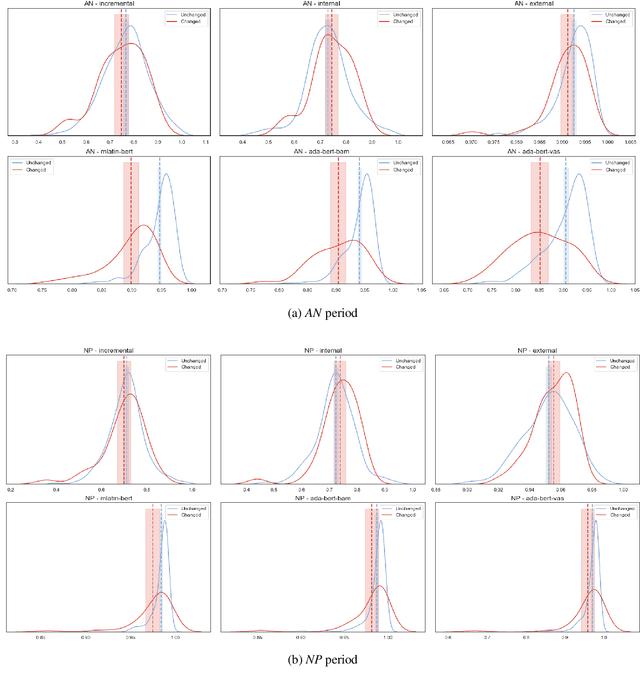Qianfeng Wen
Comparative Analysis of Static and Contextual Embeddings for Analyzing Semantic Changes in Medieval Latin Charters
Oct 11, 2024



Abstract:The Norman Conquest of 1066 C.E. brought profound transformations to England's administrative, societal, and linguistic practices. The DEEDS (Documents of Early England Data Set) database offers a unique opportunity to explore these changes by examining shifts in word meanings within a vast collection of Medieval Latin charters. While computational linguistics typically relies on vector representations of words like static and contextual embeddings to analyze semantic changes, existing embeddings for scarce and historical Medieval Latin are limited and may not be well-suited for this task. This paper presents the first computational analysis of semantic change pre- and post-Norman Conquest and the first systematic comparison of static and contextual embeddings in a scarce historical data set. Our findings confirm that, consistent with existing studies, contextual embeddings outperform static word embeddings in capturing semantic change within a scarce historical corpus.
Elaborative Subtopic Query Reformulation for Broad and Indirect Queries in Travel Destination Recommendation
Oct 02, 2024Abstract:In Query-driven Travel Recommender Systems (RSs), it is crucial to understand the user intent behind challenging natural language(NL) destination queries such as the broadly worded "youth-friendly activities" or the indirect description "a high school graduation trip". Such queries are challenging due to the wide scope and subtlety of potential user intents that confound the ability of retrieval methods to infer relevant destinations from available textual descriptions such as WikiVoyage. While query reformulation (QR) has proven effective in enhancing retrieval by addressing user intent, existing QR methods tend to focus only on expanding the range of potentially matching query subtopics (breadth) or elaborating on the potential meaning of a query (depth), but not both. In this paper, we introduce Elaborative Subtopic Query Reformulation (EQR), a large language model-based QR method that combines both breadth and depth by generating potential query subtopics with information-rich elaborations. We also release TravelDest, a novel dataset for query-driven travel destination RSs. Experiments on TravelDest show that EQR achieves significant improvements in recall and precision over existing state-of-the-art QR methods.
Monte-Carlo Tree Search for Behavior Planning in Autonomous Driving
Oct 18, 2023Abstract:The integration of autonomous vehicles into urban and highway environments necessitates the development of robust and adaptable behavior planning systems. This study presents an innovative approach to address this challenge by utilizing a Monte-Carlo Tree Search (MCTS) based algorithm for autonomous driving behavior planning. The core objective is to leverage the balance between exploration and exploitation inherent in MCTS to facilitate intelligent driving decisions in complex scenarios. We introduce an MCTS-based algorithm tailored to the specific demands of autonomous driving. This involves the integration of carefully crafted cost functions, encompassing safety, comfort, and passability metrics, into the MCTS framework. The effectiveness of our approach is demonstrated by enabling autonomous vehicles to navigate intricate scenarios, such as intersections, unprotected left turns, cut-ins, and ramps, even under traffic congestion, in real-time. Qualitative instances illustrate the integration of diverse driving decisions, such as lane changes, acceleration, and deceleration, into the MCTS framework. Moreover, quantitative results, derived from examining the impact of iteration time and look-ahead steps on decision quality and real-time applicability, substantiate the robustness of our approach. This robustness is further underscored by the high success rate of the MCTS algorithm across various scenarios.
 Add to Chrome
Add to Chrome Add to Firefox
Add to Firefox Add to Edge
Add to Edge